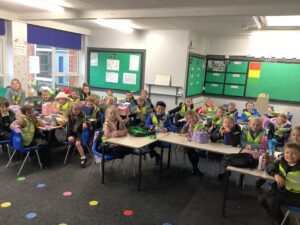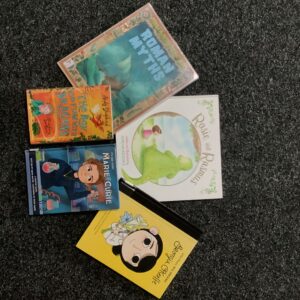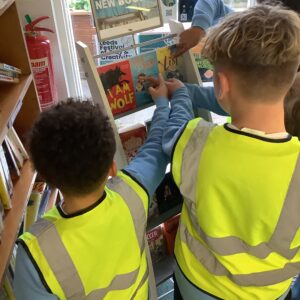Our new school charity
As part of our Community Week, we have been discussing about charities and how charity is the act of giving help to those who need it. There was a list of charities for each class to research and consider. The children enjoyed discussing these with their peers. A democratic vote was made in each class and the result was brought to the Junior Leadership Team. They discussed the votes and settled on The Willow Foundation.
The main objective of the charity is to support 16-40 year olds in the UK who are newly diagnosed with a life-threatening illness. When they should be enjoying the prime of life, they’re dealing with stress, isolation, medication and hospital appointments.
Willow believes that every moment should be precious. They’re dedicated to helping young adults take much needed time out from the reality of living with serious illness, creating magic moments that become lasting memories.
If you’d like to find out more about the charity, please visit the website below.
https://www.willowfoundation.org.uk/
Fundraising that takes place this year will be donated to this charity.
Thank you for your support with this.
Scholes Community Library
All classes in school have been lucky enough to visit Scholes Library this week. It has been a fabulous opportunity to support a great community resource which we are fortunate enough to have on our school’s doorstep. Each class had the opportunity to explore the library and to bring back five books to enjoy in class.



















Help at home: Visit the library with your child. You can help to engage your child with reading new books and help to support our local community at the same time.
Community week – library visit
We were lucky enough in 5,6B to start Community week off by visiting Scholes library. Even though it is only two minutes from school, it was great to be reminded of what a little gem it is. We were given a talk on how the library runs by Madeline and what books are stocked in the library. She emphasised how easy it is to get a library card and be able to borrow books to enjoy at home. We then spent some time perusing the shelves in order to select a few books to bring back and enjoy in class.



Help at home: Encourage your child to visit the library and access this brilliant resource. It will get your child enthusiastic about reading at home!
New Junior Leadership Team
Democracy is a key part of British Values and during this week, our classes have cast their votes for who they would like to represent their class on the JLT. We were absolutely overwhelmed by the number of children that wrote speeches. These were well written, full of ideas and showed off their best qualities such as leadership, good listening skills and initiative.
The votes were counted and the new members have been announced!
Here are our new members:
5,6A – Ben
5,6B – Lilly
5,6C – Jeevan
3,4A – Bradley
3,4B – Violet
3,4C – Adam
2C – Ted
1,2B – Mollie
1A – Rupert
Well done to each of you. I’m looking forward to working with you this year and can’t wait to get started.
Science – Electricity
This week in Science we have started our new unit all about electricity. We began by seeing what we could remember about our previous learning and then shared this with our talk partners. We discussed that we would be using electrical components and that we needed to stay safe using equipment such as batteries. We worked together to create a series circuit and then added additional components to see the impact it had. The children drew scientific diagrams of their circuits and used the appropriate symbols. The children also used an app on the ipads to explore this further.




Help at home: Ask your child what a series circuit is and what the components are that make up a circuit.
Reading as historian
This week in reading we are linking our learning to our history topic – Ancient Egypt. The children studied labelled diagrams of the pyramids and how they are structured. The children had to research whether the sources of information were reliable – they used websites to validate the information and to also study the websites to see if they were trustworthy. The children were able to identify how one source of information was unreliable as it wasn’t a secure site. They were able to validate information by finding similar information elsewhere.




Watch Us While We Work
Thank you to the parents who could attend our Watch Us While We work lesson earlier on in the week.
In 56C, we talked about some strategies to help with homework.
Spellings:
Have you tried playing hangman? This is a great game for spotting spelling patterns. It also means that children will get a chance to really study the 40 word list.
Using story dice as a stimulus for writing sentences, is a a great way to learn how to use the spellings in context.
Another way to avoid the repetition of writing out the words is to play Mind Meld. Partners work together to get the same spelling. The only rule is that you have to say yes to whatever your partner says.
E.g.
Partner one: Our word begins with the letter E.
Partner two: Yes and our word has a double SS.
Partner one: Yes and our word has an a followed by an R.
Together: Our word is embarrass.
Reading:
Reading aloud to and with a child is still a really important way of teaching reading skills. We looked at ways to narrate our thoughts as we read. We might read a few sentences and reflect on what we have read.
Another way to share the love of reading is to take turns when reading. Read a line, paragraph or page each.
Finally, if there is lots of speech, you could each take on a role to play. How can you change your voice/ pace to suit that character?
Reading: debate

This week, our topic learning linked with our reading lessons. We were developing our ability to explain a personal point of view, giving reasons for our views.
As part of our learning about Ancient Egypt, we had a debate about Howard Carter – the archaeologist who discovered the tomb of Tutankhamun.
Our debate statement was:
Howard Carter is a positive figure in history.
The children used trusted websites to research the topic and develop debate points. Half of the children were in support of the statement and the other in opposition.
We discussed good techniques for a debate such as projecting our voices, giving evidence and listening respectfully to other people’s opinions. Our oracy skills were very useful here. The children all used some great debate style sentence stems to help put their opinions across to the opposing team.

The result was a very respectful and articulate debate.
Help at home: Ask your child about their opinion of Howard Carter.
We are writers!
The year 5, 6 phase have been working really hard producing some recounts over the last couple of weeks. We used part of our class novel ‘Secrets of a Sun King’ by Emma Carroll as inspiration for our writing. There is a section of the novel in which the main character finds a parcel and has the dilemma of whether to open it or not. As writers, the children created descriptive paragraphs using adventurous vocabulary and they created tension for the reader. We worked hard to think about how to start sentences in different ways, such as using a verb or a question. We also added adverbials to add more information to the verb.
Help at home: Can your child write some sentences beginning with a verb that ends in -ed or -ing. For example:
Drifting down, the leaves suffocated the ground as the silence engulfed the darkness.
Connect Challenge
Thursday saw the whole school take part in the Connect Challenge in support of the Rob Burrow Foundation. This event was aimed at rasiing awareness of MND whilst also linking primary schools across Leeds. It promoted the idea of collaboration, physical education and friendship. We were the first school in Leeds to compete in which the children had to complete a challenge linked to the number 7. This was Rob Burrow’s shirt number when he played for the Rhinos. The children had 1 minute to complete 7 physical activities such as passing a rugby ball, hula hooping – all sorts of crazy activities! At the end of all the challenges, we filmed Lilly in year 6 throwing a rugby ball to her left. This will be incorporated into a video in which the next school receives the ball. It will eventually show all the primary schools taking part, linking together by passing the rugby ball. It was great fun and the children loved taking part in the challenge! 



